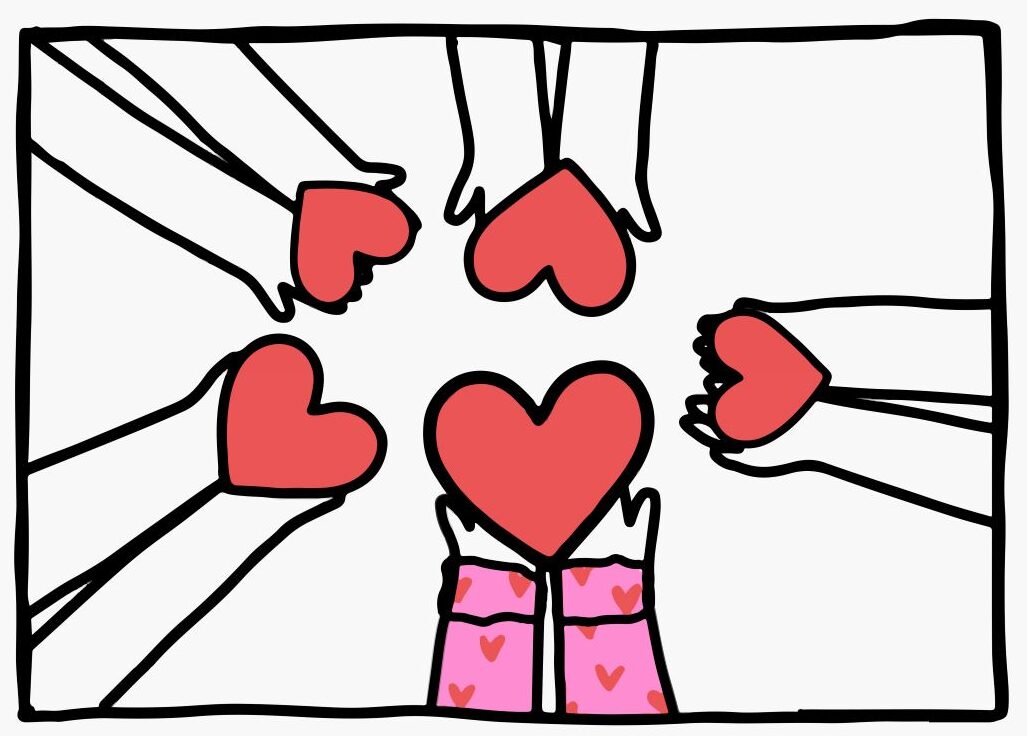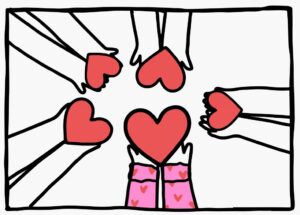
by Beth Ayers
February 27, 2024
Maintaining friendships while raising children with mental health challenges has been hard for me. I have narrowed down my list of “friends,” keeping those who could support me without judgement through extremely challenging times. I have also come to appreciate friends who are willing to say the hard things out of love that I need to hear. I deeply appreciate others who share in my lived experience and just “get it.” My own comparison and self-pity have caused me to keep some friends at a distance. The stigma associated with mental illness kept me silent about what my family was going through. And the stress of caring for my child, seeking out services, attending multiple appointments weekly, and emotional exhaustion left me little time to devote to my friendships.
 In the early years of raising children, my friends were moms at playgroup, moms whose kids were in the same grade and school as mine, or moms of the friends my child played with. Additionally, I became closer with my friends who were also having and raising children. We would talk about our kids, share parenting advice, and encourage each other that this stage we were in wouldn’t last forever. My biggest frustration was taking home parenting techniques that others swore by and have them not work for my child. It was also easy to compare milestones and worry when my child didn’t do what all the other kids were doing. I put pressure on myself to have the child that listened and didn’t get into trouble, or at least not have the one that misbehaved the worst! I still have a few friends from this time in my life. Our kids are now 19 years old, and it seems impossible they were ever little.
In the early years of raising children, my friends were moms at playgroup, moms whose kids were in the same grade and school as mine, or moms of the friends my child played with. Additionally, I became closer with my friends who were also having and raising children. We would talk about our kids, share parenting advice, and encourage each other that this stage we were in wouldn’t last forever. My biggest frustration was taking home parenting techniques that others swore by and have them not work for my child. It was also easy to compare milestones and worry when my child didn’t do what all the other kids were doing. I put pressure on myself to have the child that listened and didn’t get into trouble, or at least not have the one that misbehaved the worst! I still have a few friends from this time in my life. Our kids are now 19 years old, and it seems impossible they were ever little.
I never felt very close to my child’s classmates’ parents. The ones I chatted with when dropping off my child at their house to play or picking them up from school. The ones I sat with during all the seasons of soccer practice and games. Soccer, which by the way, has a fall season AND a spring season and there is usually snow on the ground for both. I would suggest choosing a sport for your Kindergartner that is offered only once a year or is played indoors. These friendships rarely moved past our kids and when the sport season or school year was over, I didn’t keep in touch with them.
My child maintained some close friends throughout school, and I developed friendships with some of their parents. It was always awkward when a mom and I were close and our kids quit liking each other. This seemed to happen quite often in middle school. During my child’s 8th grade graduation ceremony, I sat next to a mom I was close friends with while our children ignored each other or shot glaring looks at each other and us. We decided that just because our children weren’t friends didn’t mean we had to stop being friends. As our kids grew, though, these parent friendships became hard for me. The conversations about updates on our kids or questions they would ask were hard for me. I didn’t know how to answer truthfully and still honor my child’s privacy. I also didn’t realize how simple questions about the usual course of life our kids take can be hurtful for parents whose kids’ lives didn’t take that course. Questions about prom or driver’s licenses, graduation or work or college, reminded me that my child wasn’t experiencing these things. Instead of joy, I felt sad that my dreams for my child weren’t being realized. I wished my biggest worry was prom dresses or college options. I was just trying to keep my child alive and decide on what sort of treatment to try next. It was hard for me to maintain these friendships without comparing my life with theirs and feeling sorry for myself. I have come to realize that there are more families whose lives don’t follow the norm than do. Often times we don’t see behind the curtains of social media posts or polite conversations. I have had to let go of the friendships, through no fault of the other parent, that keep me stuck in self-pity and jealousy.
Mental illness is a tricky subject. We don’t talk openly about it whether out of stigma, fear of judgement, trying to keep the other person’s privacy, or not wanting to explain that mental illness isn’t bad parenting. (And yes, I put my child in enough social activities, and yes, I have tried whatever parenting program you’re suggesting, thanks for asking.) I know everyone means well and I know that until you have or know someone who has a mental illness, it is hard to understand. Our “fix” reflex comes from love and wanting to help, and our society has a low tolerance for sitting with others in their pain. I didn’t feel like I could share my story because it involved so many details of my child’s story and my child was very private. Not sharing with my church family was particularly hard. I would have loved to ask for prayer or receive a casserole when my child was in the hospital. At one point, my child and the child of a couple in my Sunday School class were actually in the same hospital unit at the same time. And we didn’t know because mental illness wasn’t talked about. Here was a missed opportunity to walk with other parents who knew exactly what we were going through and support each other. That seemed so ridiculous to me. In fact, a fellow parent and I began a Mental Health Friends Network at our church to spread awareness and stop the stigma of mental illness. Our campaign slogan was, “Mental illness is a casserole illness, too!”
I had a few close friends I confided in, knowing they would keep things confidential. After all, I needed support too. These close friends walked with me down dark roads, held my hand and cried with me, listened without fixing or judging, and were there for me and my family through the hard years. I could be honest about my feelings of failure, frustration, self-pity, fear, grief, and resentment. I could also celebrate with them when things were going well at home or when my child was feeling healthy, knowing my friends were sincerely happy for me. And I could also be happy for them when they had great things happen in their lives or with their children. And I could support them when their lives were hard. These friends loved me enough to express their worries or offer altering points of view or tell me when my thinking was off. Whether I agreed or not, I trusted they had my best interest at heart and was able to hear them without getting defensive. They also loved my child and were there for everyone in my family. These are the real friendships I continue to be grateful for and cherish to this day.

